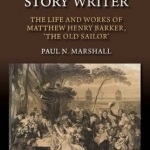
Beyond Mindfulness: The Direct Approach to Lasting Peace, Happiness, and Love
Book
Written by best-selling author, meditation expert, psychotherapist, and spiritual teacher Stephan...

Macquarie Complete Australian Dictionary
Reference and Book
App
*Macquarie Dictionary is the official dictionary of The Great Australian Spelling Bee.* The...

Regression Analysis Microsoft Excel
Book
This is today's most complete guide to regression analysis with Microsoft(R) Excel for any business...

Preserved Diesels in the UK
Book
Today, most British Rail diesel locomotive types are represented in preservation, though some...

A Nautical Story Writer: The Life and Works of Matthew Henry Barker, the Old Sailor
Book
The fictional nautical story was extremely popular in the period stretching from the mid 1820s to...

Britain's Best Small Hills: A Guide to Short Adventures and Wild Walks with Great Views
Book
Hot on the success of Wilderness Weekends, one of the top selling guides in 2015, award-winning...
Lee (2222 KP) rated Pet Sematary (2019) in Movies
Apr 2, 2019 (Updated Apr 5, 2019)
Louis Creed (Jason Clarke) is a Boston doctor who moves his family to the (hopefully) less chaotic setting of rural Maine - wife Rachel (Amy Seimetz), 8 year old daughter Ellie (Jeté Laurence), toddler Gage and friendly family cat Church. However, the family soon discover that their house is located right alongside a road which is prone to noisy trucks suddenly speeding past - our first jump scare and something already given away by the trailers! Those trucks also have a tendency to end the lives of any local pets who might happen to wander out in front of them, so it's pretty handy that there happens to be a Native American graveyard out in the woods at the back of the Creed's new house.
The local children make good use of the area, carrying out a funeral procession while wearing masks before burying deceased pets there, and they have also erected a sign - "Pet Sematary", which is nailed to one of the trees outside of it. Unfortunately, it's not too long before Church falls victim to a passing truck, at which point friendly neighbour Jud (John Lithgow) tells Louis of a special burial ritual which can be carried out on an area of ground located even further into the forest. It's a ritual that can bring the dead back to life so, in order to avoid upsetting daughter Ellie, Louis keeps the death a secret until he and Jud can head out late that night to perform the ritual with Church. Sure enough, Church is back with the family the next morning - alive, but looking very disheveled and in a seriously grumpy mood. He's not quite the cute little bundle of joy he once was - as Jud puts it, "Sometimes dead is better".
After banging on earlier about spoilers for movies, I feel it would be wrong of me to go and do the same thing here. If you're familiar with the story, then you'll know what happens anyway, although there is a moderate change of detail in this particular version which has already had a few die hard Stephen King fans up in arms. I'll just say that the special properties of the burial ground get used on a few more occasions during the course of the movie, with increasingly devastating consequences, and I personally felt that the change to the source material totally worked within the confines of this version of the story.
Ok, so what did I think of the movie overall? Well, I found Pet Sematary to be pretty intense, even more so than 'Us' recently. There were a couple of guys to the side of me in the cinema who were sitting forward on the edge of their seat for the majority of the movie just hyperventilating - I thought they were going to have a heart attack at one point! Yes, there are some jump scares, but this was more the kind of nightmare horror that I loved while watching 'Us' and it had me gripped to my seat for a good 80% or so of its run-time. Everyone involved in the movie is on top form - the children are outstanding, as is Jason Clarke, John Lithgow, even the cat! The dread-filled atmosphere, the tragedy and the horror of it all, it really resonated with me and I came away from this exhausted but happy!
Kristy H (1252 KP) rated The Stars Are Fire in Books
Feb 13, 2018
<i>This was an amazing book. </i> I'm not always an historical fiction fan (the story is based on actual fire that occurred in Maine), but I'll make an exception for Shreve, whom I've loved since her beautiful novel, [b:The Pilot's Wife|5191|The Pilot's Wife|Anita Shreve|https://images.gr-assets.com/books/1435011220s/5191.jpg|3131254]. There is just something poignant and touching about this novel. I was immediately drawn into Grace's story, and I read the novel quickly over the course of a day or so. Shreve creates a fierce and wonderful character in Grace, and you cannot help but root for her.
Grace is held back by so much in her life: her gender, her financial circumstances, her husband. After experiencing such a terrible loss: her entire town is basically burned to the ground, including her home, it's amazing to watch her resilience in the face of such horror. In many ways, it's not as if a lot happens in this novel, yet I feel like so much occurs during Grace's journey. I so loved her spirit, and I also wanted to swoop in and take away all the horrible things that occurred in her life.
I don't want to go into much detail and ruin the details of the plot, but I'll just say that this is a lovely book, with well-drawn characters--led by the tough and wonderful Grace. I was captivated by the story, and I would certainly recommend the novel. 4 stars.
<center><a href="http://justacatandabookatherside.blogspot.com/">Blog</a>; ~ <a href="https://twitter.com/mwcmoto">Twitter</a>; ~ <a href="https://www.facebook.com/justacatandabook/">Facebook</a>; ~ <a href="https://plus.google.com/u/0/+KristyHamiltonbooks">Google+</a></center>;

Foundation Website Creation with HTML5, CSS3, and JavaScript
Joe Lewis, Jonathan Lane, Meitar Moscovitz and Tom Barker
Book
Foundation Website Creation with HTML5, CSS3, and JavaScript shows the entire process of building a...
528hz Solfeggio Sonic Meditation by Glenn Harrold & Ali Calderwood
Lifestyle
App
Transform your life, repair DNA and create miracles in your life with this amazing meditation...



Sarah (7800 KP) Apr 2, 2019
Lee (2222 KP) Apr 3, 2019